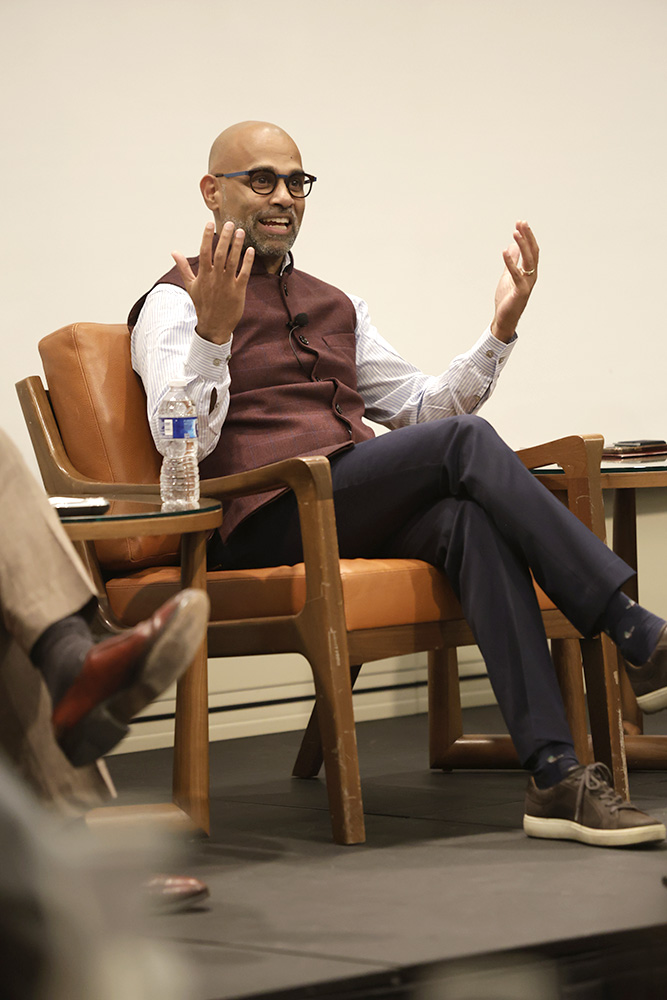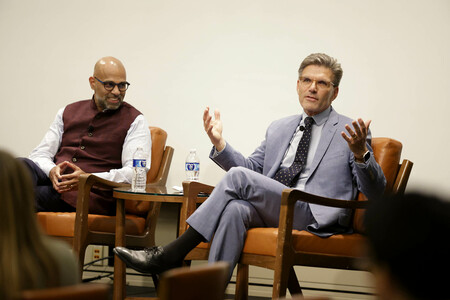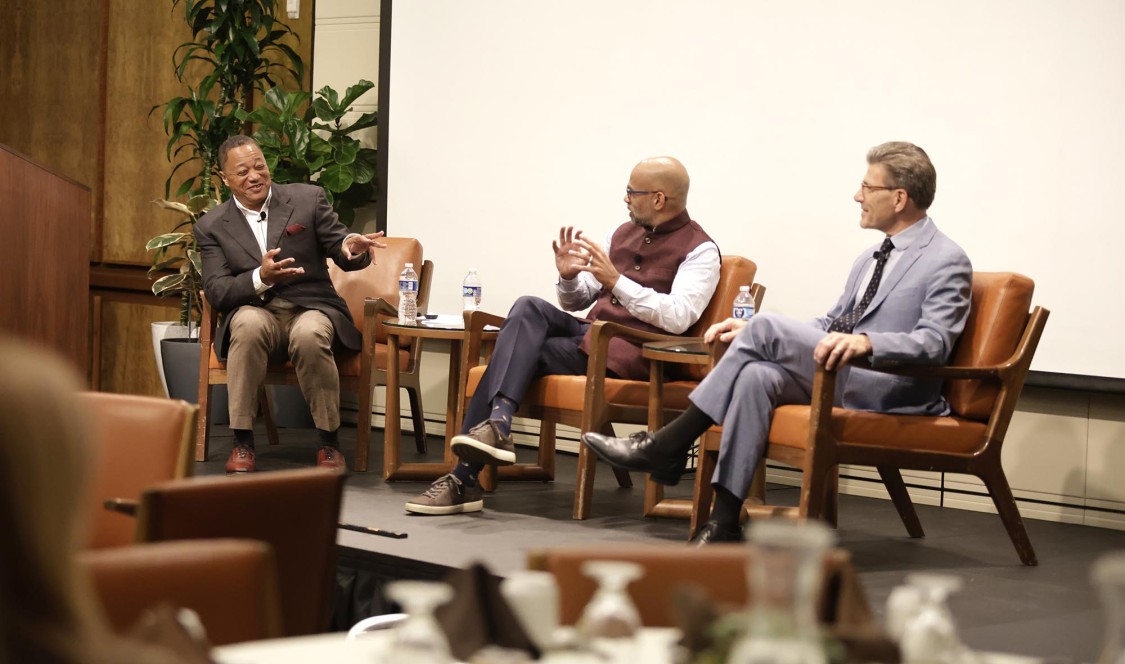Heading into the final stretch of Election Season 2024, “Civic Leadership: How Are We Doing?”—a purposeful discussion hosted at the Athenaeum—focused on the nation’s overall civic preparedness and the critical role of higher education in developing students into civic and responsible leaders.
The Oct. 25 panel featured CMC President Hiram Chodosh, Institute for Citizens & Scholars President Rajiv Vinnakota, and CMC’s Kravis Lab for Civic Leadership Executive Director Vernon Grigg. The President’s Leaders Forum and Kravis Lab co-sponsored the event, which highlighted the importance of civic education and emphasized the need for informed engagement to develop effective citizenry.
“I love this institution, and the work you are doing,” said Vinnakota, noting how he spent time before the Ath panel meeting with CMC students and faculty.

Vinnakota, a leading voice in civic leadership and reform, is the seventh president of the Institute for Citizens & Scholars (C&S), where he leads “its mission to cultivate the talent, ideas, and networks that develop lifelong, effective citizens.” He served as the EVP of the Youth & Engagement division at the Aspen Institute prior to joining C&S in July 2019. Since then, Vinnakota has focused on the question: How do you develop civic virtues in young people?
“Because if you’re solely focused around personal, selfish desires, you don’t have community,” Vinnakota said. He then described how C&S developed a focus on “most of you in this room,” 18–24-year-olds, who over the next decade are entering the public square. “If we do a good job developing you into effective and engaged citizens, we’ll be fine in this country. If we don’t, we’re going to continue this reversion to authoritarianism. And so … this is the work that is in front of us, and it’s why I travel all around the country and work with so many different people.”
One of those people is President Chodosh, who has worked closely with Vinnakota and C&S on a large national collaboration, College Presidents for Civic Preparedness. With President Chodosh playing a significant leadership role through the Open Academy’s commitments to freedom of expression, viewpoint diversity, and constructive dialogue, CMC was one of the first higher education institutions to join the C&S college civic engagement initiative. The coalition currently numbers 112 college presidents from a diverse range of institutions.
During the panel conversation, Grigg noted how last spring CMC launched the Kravis Lab for Civic Leadership to address, in alignment with Open Academy principles and C&S, the “same urgencies and needs, and the desire to provide to our students robust opportunities to learn at a deeper level a notion of applied civics.”
“The commitment to building these resources at CMC is everywhere you look,” Grigg added.
Among the activities hosted by CMC this semester to encourage engagement around community building and election resources: Athenaeum talks with a variety of speakers, including Colorado Gov. Jared Polis for the Dreier Roundtable Civility Award, Dean Logan, and Willie Brown; proactive constructive dialogue and self-authorship sessions organized by the Dean of Students and CARE Center; the Open Academy Saturday Salon series (informal faculty and student discussions on timely topics curated by professors and research institutes); and ongoing activities organized by academic departments and institutes, centers, and labs, including the Rose Institute’s Video Voter Guide and the Kravis Lab’s Civitas Sessions, debate watch parties, and voter education drives, including an off-campus trip to the L.A. County Ballot Collection site.

As demonstrated by the breadth of activities, President Chodosh emphasized that developing creative solutions to complex challenges requires applying all three Open Academy commitments interdependently and consistently across the entire CMC experience. Those “little moments of practice and experience, return on investment and value” subsequently make it easier for students to build confidence and keep applying their knowledge to new opportunities.
“I think what’s powerful about what Vernon is doing at the Kravis Lab, and what our other institutes and centers at CMC do, is giving each of you opportunities to engage outside of the College, to engage in smaller chunks of challenges that give you a positive feedback response of having an impact … which help you practice those skills of getting things done,” President Chodosh said. “You learn, sometimes through failure, sometimes through modest success, but it gives you that positive cycle of doing and learning that then becomes very powerful.”
When the time for student questions arrived, Caleb Rasor ’28 said he enjoyed the panel because “ideas and discussions (like this) brought me to CMC.”
He asked: “Should we reframe the push for principles of free inquiry and civil discourse in higher education? Should we instead frame it as having a more open-minded electorate than an engaged electorate?”
Vinnakota answered: “Part of this is about, are you civically well-informed? Are you productively engaged in multiple ways? And are you committed to democracy in America?
“We, as a country, have focused so much on elections and their impact at the federal level that we have forgotten to actually say two things to everybody, right? One is, you can make a tremendous difference on probably the most important thing that we think about, deciding on who is going to be representing you in your town council and [state government].
“And the second thing is: I can point to two instances, including one in the 2020 election, where there was a tie in the race for state delegate in the state of Virginia. They literally had to flip a coin to decide—was it going to be a Democrat or Republican who represented that district? So, nobody can tell me that your single vote doesn’t count.”

